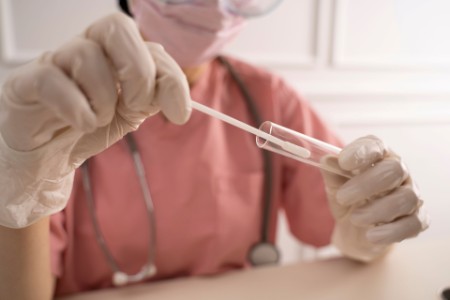
COVID testování zaměstnanců na pracovištích opět povinné
V souvislosti se zhoršující se epidemiologickou situací vláda schválila návrh mimořádného opatření Ministerstva zdravotnictví, kterým se opětovně zavádí povinnost zaměstnavatelů provádět pravidelné testování zaměstnanců přítomných na pracovišti na COVID-19.
Kdy bude pravidelné testování zahájeno a jak často bude probíhat?
Mimořádné opatření nabylo účinnosti dne 22. listopadu 2021. Všichni zaměstnavatelé na území České republiky jsou na jeho základě povinni zajistit první kolo testování nejpozději do 29. listopadu 2021, a následně vždy s frekvencí jedenkrát za týden.
V případě, že zaměstnanec nebude v den termínu testování přítomen na pracovišti zaměstnavatele, podstoupí pravidelné testování v den svého příchodu na pracoviště.
Jak lze zaměstnance testovat a kdo ponese náklady?
Zaměstnavatelé jsou povinni zajistit testování zaměstnanců prostřednictvím:
- rychlého antigenního testu určeného pro samotestování provedeného na pracovišti; nebo
- rychlého antigenního testu prováděného poskytovatelem zdravotních služeb.
Zaměstnavatelé zajišťující pro své zaměstnance testování jsou povinni vést evidenci provedených testů, a to v rozsahu data testování a jmen osob, které testování v daný den podstoupily.
Z povinnosti zajistit testování plyne i povinnost zaměstnavatelů hradit náklady na něj. Příspěvek na testy, který zaměstnavatelé mohli žádat na jaře, zatím obnoven nebyl, předpokládáme však, že o alespoň částečné náhradě nákladů zaměstnavatelů bude ještě rozhodnuto.
Kterých zaměstnanců se testování týká?
Povinnost pravidelného testování není v tuto chvíli stanovena pro všechny zaměstnance. Zaměstnavatel není povinen zajistit testování zaměstnanců, kteří:
- jsou očkováni proti onemocnění COVID-19 a od dokončeného očkovacího schématu uplynulo nejméně 14 dnů;
- prodělali laboratorně potvrzené onemocnění COVID-19, od nařízené izolace a od prvního pozitivního rychlého antigenního testu nebo PCR testu neuplynulo více než 180 dní;
- podstoupili v posledních 7 dnech PCR test s negativním výsledkem; nebo
- podstoupili v posledních 7 dnech rychlý antigenní test provedený zdravotnickým pracovníkem s negativním výsledkem.
Zaměstnavatel není dále povinen testovat zaměstnance, kteří se vzhledem k povaze své práce na svém pracovišti nesetkávají se třetími osobami, tedy například zaměstnance pracující pouze z domova. Všichni zbylí zaměstnanci jsou povinni na výzvu zaměstnavatele testování podstoupit.
Jak mohou zaměstnanci prokázat, že se nemusí testovat?
Zaměstnanci uvedení výše jsou povinni skutečnost, na základě které jsou vyňati z povinnosti pravidelného testování, zaměstnavateli prokázat (s výjimkou zaměstnanců bez kontaktů se třetími osobami). Očkování lze prokázat národním certifikátem o provedeném očkování nebo EU COVID certifikátem. Zbylé skutečnosti lze prokázat záznamem v Informačním systému infekčních nemocí nebo potvrzením vystaveným lékařem.
V souvislosti se zpracováním výše uvedených skutečností jsou zaměstnavatelé povinni řídit se ustanoveními obecného nařízení o ochraně osobních údajů, které považuje údaje o zdravotním stavu zaměstnanců za tzv. „citlivé údaje“. Zaměstnavatelé jsou povinni informovat zaměstnance o zpracování těchto osobních údajů, zpracování citlivých údajů řádně zabezpečit a zajistit, že k nim bude mít přístup pouze velmi úzký okruh osob v rámci zaměstnavatele.
Jak postupovat v případě, že zaměstnanec odmítne testování?
Odmítne-li zaměstnanec testování podstoupit, je zaměstnavatel povinen tuto skutečnost bez zbytečného odkladu ohlásit místně příslušnému orgánu ochrany veřejného zdraví (hygienické stanici).
Odmítající zaměstnanec může zůstat na pracovišti, ale je povinen nosit respirátor po celou dobu své přítomnosti na pracovišti, dodržovat od ostatních osob rozestup alespoň 1,5 metru a stravovat se odděleně od ostatních osob. Zaměstnavatel je povinen přijetím vhodného organizačního opatření zajistit omezení setkávání tohoto zaměstnance s ostatními osobami na nezbytnou míru.
Stejná omezení je dle našeho názoru potřeba vztáhnout i na zaměstnance, který test odmítne například z důvodu očkování či prodělání nemoci, ale tyto skutečnosti zaměstnavateli neprokáže (odmítne, či nemá potvrzení).
Jak postupovat v případě pozitivního výsledku testování?
V případě, že výsledek testu bude pozitivní, dotčený zaměstnanec je povinen okamžitě opustit pracoviště, nahlásit výsledek zaměstnavateli a v případě, že se jednalo o samotest, uvědomit o výsledku poskytovatele pracovnělékařských služeb zaměstnavatele nebo ošetřujícího lékaře, který mu následně vystaví žádanku na potvrzující PCR test. Zaměstnanec je povinen podrobit se potvrzujícímu PCR testu bez prodlení.
Doba od zjištění pozitivního výsledku testu do obdržení výsledku potvrzujícího PCR testu je překážkou v práci na straně zaměstnavatele, za kterou zaměstnanci přísluší náhrada mzdy ve výši průměrného výdělku.
Další vývoj nejen povinného testování zaměstnanců sledujeme a budeme Vás o něm informovat. V případě zájmu o podrobnější informace se prosím obraťte na autorky článku nebo na další členy advokátní kanceláře EY Law či týmu EY, se kterými spolupracujete.
Autorky:
